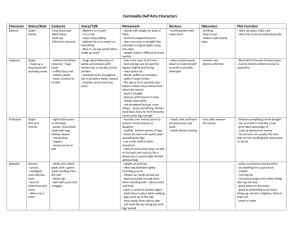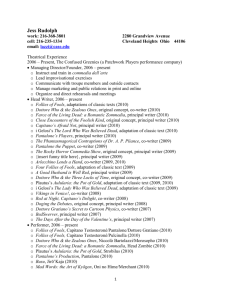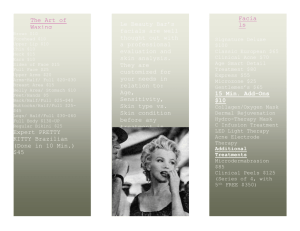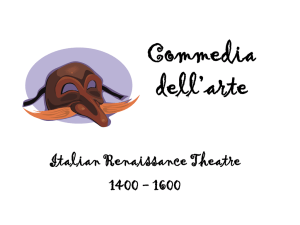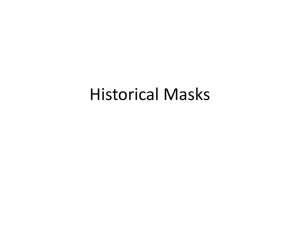Commedia Character Descriptions
advertisement
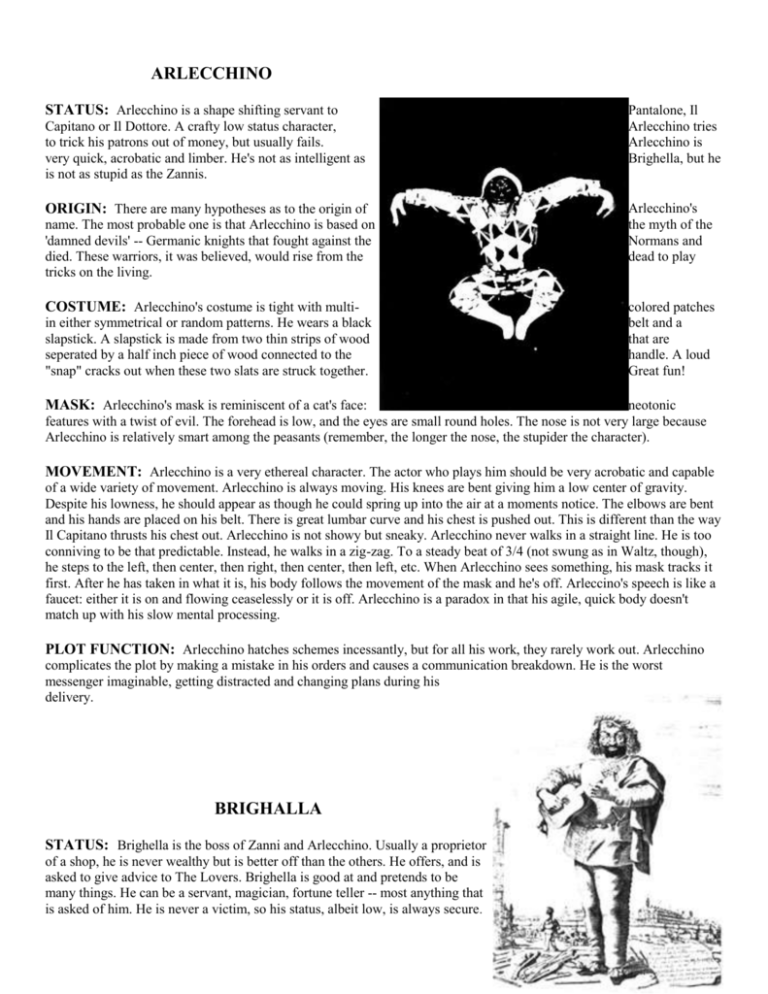
ARLECCHINO STATUS: Arlecchino is a shape shifting servant to Capitano or Il Dottore. A crafty low status character, to trick his patrons out of money, but usually fails. very quick, acrobatic and limber. He's not as intelligent as is not as stupid as the Zannis. ORIGIN: There are many hypotheses as to the origin of name. The most probable one is that Arlecchino is based on 'damned devils' -- Germanic knights that fought against the died. These warriors, it was believed, would rise from the tricks on the living. COSTUME: Arlecchino's costume is tight with multiin either symmetrical or random patterns. He wears a black slapstick. A slapstick is made from two thin strips of wood seperated by a half inch piece of wood connected to the "snap" cracks out when these two slats are struck together. Pantalone, Il Arlecchino tries Arlecchino is Brighella, but he Arlecchino's the myth of the Normans and dead to play colored patches belt and a that are handle. A loud Great fun! MASK: Arlecchino's mask is reminiscent of a cat's face: neotonic features with a twist of evil. The forehead is low, and the eyes are small round holes. The nose is not very large because Arlecchino is relatively smart among the peasants (remember, the longer the nose, the stupider the character). MOVEMENT: Arlecchino is a very ethereal character. The actor who plays him should be very acrobatic and capable of a wide variety of movement. Arlecchino is always moving. His knees are bent giving him a low center of gravity. Despite his lowness, he should appear as though he could spring up into the air at a moments notice. The elbows are bent and his hands are placed on his belt. There is great lumbar curve and his chest is pushed out. This is different than the way Il Capitano thrusts his chest out. Arlecchino is not showy but sneaky. Arlecchino never walks in a straight line. He is too conniving to be that predictable. Instead, he walks in a zig-zag. To a steady beat of 3/4 (not swung as in Waltz, though), he steps to the left, then center, then right, then center, then left, etc. When Arlecchino sees something, his mask tracks it first. After he has taken in what it is, his body follows the movement of the mask and he's off. Arleccino's speech is like a faucet: either it is on and flowing ceaselessly or it is off. Arlecchino is a paradox in that his agile, quick body doesn't match up with his slow mental processing. PLOT FUNCTION: Arlecchino hatches schemes incessantly, but for all his work, they rarely work out. Arlecchino complicates the plot by making a mistake in his orders and causes a communication breakdown. He is the worst messenger imaginable, getting distracted and changing plans during his delivery. BRIGHALLA STATUS: Brighella is the boss of Zanni and Arlecchino. Usually a proprietor of a shop, he is never wealthy but is better off than the others. He offers, and is asked to give advice to The Lovers. Brighella is good at and pretends to be many things. He can be a servant, magician, fortune teller -- most anything that is asked of him. He is never a victim, so his status, albeit low, is always secure. COSTUME: Brighella wears a white shirt, black pants with a green tassle hanging from the side, a white cap, a belt with a purse, and a dagger. MASK: Brighella's mask should convey the intelligent and malicious spirit in him. The mask is accented with a hooked nose, fleshy cheeks, and large eyebrows. He conveys a cynical-mawkish appearance. MOVEMENT: Brighella's weight is placed on a bent leg. The other is extended, lightly touching the ground. His elbows are up with his hands spread out. Whether or not he is moving, his feet are constantly moving, dancing back and forth. Like Arlecchino, his back is curved at the lumbar region. When Brighella walks, his head stays in place, but his legs come up to the side and his torso sways from side to side. It is a very soft walk, similar to tip-toeing, the difference being that his legs are spread. PLOT FUNCTION: Brighella is a very cynical and sarcastic character. For the audience, he is witty, humorous and deceitful. He will do anything to turn a quick buck, even if selling his sister. He is a cunning liar on occasion bursting when something doesn't go his way. This is a volatile had friends who have turned into mean people after it requires him out in angry rants characer! I have playing Brighella. CAPITANO STATUS: Il Capitano (The Captain) is a bragadocious, arrogant, egocentric man feigning machismo. Behind this thick façade of manliness and courage, he is, in fact, a timid coward afraid of most everything. He probably is not a Captain in an army, but because he moves around from city to city, he is able to pretend he has higher status than he really should. Il Capitano is feared by the townspeople only because he puts on a convincing (albeit absurd) show of intimidation. NAME: The actor who plays Il Capitano can make the characters name up. Usually the name is big, long, and made to sound important. When I play this character, I use: "Il Magnificum Terriblus Banania Englebert Humperdink Capitano Esquire the Third, son of Zeus, father and brother of Jupiter." COSTUME: Il Capitano's costume is a satire on the military. Huge boots swallow his feet, if not part of his legs; He has a ruffled, fancy hat and a military jacket -- anything that mocks the fighting institution. He wears a sword on his belt, but never uses it. If it is drawn for some reason, he is overwhelmed and terrified. MASK: There are two types of Capitano masks. The one shown below exhibits stern features and a long phallic nose and large eye holes. The second variety has a small nose and a more comical face: smaller eyes, a mustache and larger cheeks. MOVEMENT: Il Capitano tries to make himself seen at all times. His feet and legs are far apart in order to make himself appear more mighty and strong. His chest sticks out, puffed up with his shoulders broad. He walks in large strides, lifting his leg up as far as possible and then placing it down mere inches from where it started. His back is straight, and he prances with a bounce in his step. All of his walks are very showy and as a result, quite slow. Il Capitano's run is prompted by any loud sound, scary object or from being overwhelmed. When this happens, he drops everything, throws his head back, kicks his feet forward and howls is fear. Just like in his walk, he picks his legs up high, but puts them down close to where they started. GESTURES: Il Capitano is a piteous coward. Completely opposite from his façade, he is frightened all too easily. When he sees anything he deems a threat (particularly mice) he shakes down to a squat making himself as small as possible and whimpers. Il Capitano brags about his sexual prowess and fierceness is battle, but is overwhelmed by women and terrified of confrontation. He wants to be seen at all times. Craving attention, he stops when he sees the audience and presents himself by showing off. The audience should realize from the start that everything that The Captain does is a farce and betrays his rough exterior. PLOT FUNCTION: Il Capitano must always fall at the end of every Canovacci. Events always unfold to show his blind cowardice. DOTTORE STATUS: Il Dottore is high in the commedia social hierarchy along with the other old men like Il Capitano and Pantalone. Il Dottore is a doctor, although it is questionable whether he has ever attended school. Nevertheless, Il Dottore maintains his high position in society because he can make it seem as though he knows what he is talking about. He blathers in fake Latin, on and on. The lower class characers are awed by his "knowledge" and so he maintains his status. Like all the old men, however, he is always shown up as a quack at the end of the play. COSTUME: Il Dottore wears a long jacket with a black coat that goes all the way down to his ankles. Black shoes accessorize his feet and a skull cap is worn on his head. Il Dottore is a very fat man, so if the actor is not himself large, a pillow should be strapped about the stomach. MASK: The mask covers just the eyes and the nose leaving the cheeks exposed. Because The Doctor is very fat and he enjoys drinking, the nose is bulbous and the forehead high. The actor's cheeks are usually reddened to show the affects of the liquor. MOVEMENT: Il Dottore stands with his great weight on the back of his heels and his stomach slopped forward, hands gesturing with every word. Il Dottore always walks when he talks. Instead of in a straight line, he meanders in figure eights using tiny steps. His weight makes it difficult for him to move fast. GESTURES: Il Dottore wants all the space on the stage for himself and he takes up room with his gut and his words. Because he is from the city of Bologna, he loves to eat. His prominent stomach is the focus of attention. He makes crude sexual jokes and is fond of pornography. Il Dottore's speech is the key to his character. He has a lisp and never stops talking. He believes he is an expert on anything and everything. Not knowing what he is talking about, he nonetheless sprinkles in very large words (most times fake) to sound convincing. PLOT FUNCTION: Il Dottore gives the other actors a break by taking up space and time to talk. He is usually onstage for a long time, having to be removed either physically (while still talking) or after having been convinced that he should go in order to free up the stage. THE LOVERS STATUS: The Lovers are high status. They are the sons and daughters of the old men characters with high social status. The Lovers' status rating is diminished, however, because of their infatuated states. COSTUME: The Lovers are costumed in the latest fashion. Males sometimes dress up as soldiers, while the women show off the newest clothing (sometimes changing more than once during a show). Regardless, The Lovers are rich so they wear the most ornate and expensive styles. MASK: The Lovers do not wear masks; instead, they wear makeup. Usually the foundation color is white with red lips painted on. The interpretations of what The Lovers' makeup is usually vary widely. MOVEMENT: The Lovers stand firmly rooted, but light in the torso and head. They are whimpering fluffs of infatuation and their stance should convey their fragility. They take many breaths and seem like bubbles -- they could pop at any time. They wobble rather than walk, floating from side to side. GESTURES: One hand usually holds a prop of some type, usually a letter one is swooning over or a handkerchief. Their arms are never in the same position; they are always primping to make sure that they look their best. The Lovers enjoy lamenting their situation and speaking pretentiously to each other about their love for one another. They are in love with themselves and their expressions of love that they spout. Contact is rarely made in the courting/wooing and so the ceaseless, foolish exchange continues unabated. PLOT FUNCTION: Without The Lovers' problems, complications in the Cannovacci would not so readily occur. PANTALONE STATUS: Pantalone, because he is rich and miserly, holds the status in the commedia hierarchy. He always has servants working highest social for him. Pantalone is deathly afraid of losing his money which, in turn, would cause him to lose his place in society. COSTUME: Pantalone wears tight red trousers or stockings, a jacket, loose black cloak with long, billowy sleeves, a red skullcap, slippers and most important of all, a money purse on his belt. MASK: Pantalone's long, hooked nose seems to meet his chin. The mask should convey a squinty, miserly appearance: mustache, small beady eyes, very pointed. MOVEMENT: Pantalone, being an old man, hunches over the money purse on his belt protecting it from thieves or a daughter who might need money for a snack. He shuffles across the stage, the motion of his legs very limited. His knees are bent with the pelvis open spreading the legs. Pantalone can mimic the walks of all the other characters. Upon hearing bad news, he falls flat on his back, and curls up like a dying insect. But like a turtle, he cannot right himself without someones help. GESTURES: Although Pantalone's body is old, his hands, feet and head are very expressive and quick. His hands are always moving, gesticulating each thought that comes to him. Due to trouble with his prostate gland, Pantalone has difficulty getting an erection. Despite this setback, he lusts after women and schemes to get them. Lewd and lascivious toward them, he makes all sorts of innuendos and cat calls. Pantalone believes that everything can be bought. PLOT FUNCTION: Just like Il Capitano and Il Dottore, Pantalone is made to look like a fool. He is taken advantage of and ends up money or swindled out of most of it. His servants (Brighella, or all three) are usually the ones that set him up for his fall. set up to fall or without his Arlecchino, Zanni ZANNI STATUS: Zanni is the lowest on the social ladder. He is the poorest, stupidest, and hungriestservant imaginable. He serves either Il Dottore, Il Capitano or Pantalone and never does a good job. Sleeping on the job, sneaking off to eat food, or daydreaming, Zanni cannot do what he is told very well at all. He is driven by sex and hunger. COSTUME: Because Zanni is so poor, he wears very simple clothing. Usually he is dressed in a baggy white outfit. MASK: Zanni has a furled brow and an extraordinarily large nose. His eyebrows are low giving him a dull, stupid appearance. The longer the nose, the stupider the Zanni. MOVEMENT: Zanni's movements are very exaggerated and his head sticks out seperately from the movements of his body. His nose points to the subject of interest. Zannis with smaller noses are quicker witted (but still terribly dumb) and can do acrobatics. With a very low center of gravity, his lower back is arched with all the weight on one bent leg. The other leg is pointed out in front of him. His legs are always changing back and forth from bent to straight as he listens without moving his head . Zanni sleeps all the time and does this by standing on one leg and crosses his other leg over his knee. Zanni props his head on his arm on his knee and goes to sleep making lots of noise (belching, farting, snoring, etc). Zanni's actions are very urgent and pressing. He seems nervous and his nose is the center of his actions. GESTURES: Zanni has little control of his body. Sometimes limbs will become "possessed" and start acting up all by themselves contrary to Zanni's knowledge. He is always hungry and sees the possibility of food in anything. His imagination is influenced by his insatiable appetite. Zanni is stupid, foolish, has limited self-awareness but is very loyal. In many ways he is like a dog. PLOT FUNCTION: Zanni carries the plot along and confuses it by messing up. His attempts to complete a task lead to something going awry. The forays into his imagination are quite comical. They are called lazzi. Source: www.geocities.com/commedia_dellarte/
